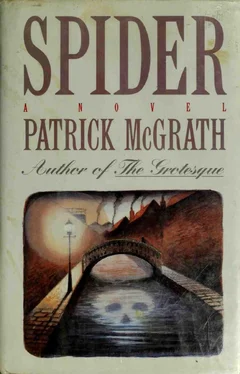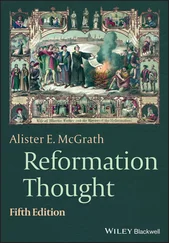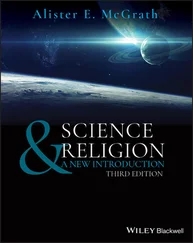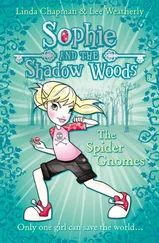Then we were on the main road and going at some speed. I tried to see what lay ahead, but could not, I could not imagine the way of life I was now to pursue. How would I live? Who would I be? Dennis Cleg, from Ganderhill? The lunatic? Oh surely not that—I could imagine, at least, the effect of that, the cold eyes, the sneers, the whispering contempt—the thought patterns, in short. Suddenly I saw myself hurtling into a void, and for a few minutes I became uncoupled with terror and froze rigid in my seat with my cigarette halfway to my lips. Immediately I felt the eyes of the women on me, their heads inclining toward one another, the murmuring, the stifled laughter, the muffled snorts of scorn. It passed off soon enough thank God, and with an effort I stayed calm. Later I began to see streets and buildings and I knew we were on the outskirts of the city, and this gave me some small comfort; I am the Spider of London, after all! Over the river by Westminster Bridge, the Thames alive with light, sparkling green in the autumn sunshine, and the sight of it did me good. A little familiarity, that’s all, a little of what you know, this buttresses a soul, gives strength. I pulled out the slip of paper with Mrs. Wilkinson’s address on it: I knew the place, I’d often been over that way as a boy. It was in the East End, you see.
A bit of trouble with the crowds at first—the eyes! the thought patterns! The air was thick with them, and again I became uncoupled, I stood in the middle of Victoria Coach Station gripping my suitcase and frozen like a statue. But this was London, after all, and I knew London, and soon I was shuffling off to look for a number twenty-seven bus, or was it a thirty-seven, or a hundred and thirty-seven?
In the late afternoon I fetched up at Mrs. Wilkinson’s door. I’d got lost several times, for the city had changed in ways I couldn’t understand. I knocked; she opened the door. “Mr. Cleg?” she said. “We’ve been expecting you.” I shuffled in, exhausted and confused and very close to tears, and not for one moment did I realize who she was. It’s only now that I can appreciate the implications of those first words of hers. “We’ve been expecting you,” she might have said, “so we can finish the job we started in Kitchener Street, twenty years ago.”
Iwrapped my limbs with fresh newspaper, I found clean socks in the chest of drawers and threw the old ones into the hole behind the gas fire. Then flat on my back on my bed, hands behind my head, legs crossed at the ankles, to watch cigarette smoke curling and coiling beneath the ceiling. Down my trousers, between my thighs, in my sock, the thick solid pressure of her house keys. They are bound together with a stout rubber band to keep them from clanking against each other and so betraying their presence.
The bell at last, and I am up off my bed and smartly down the stairs even as the first of the dead souls emerge blinking from their holes. All as usual in the kitchen—the mustached one dripping ash into her saucepans, the tarpaulin on the table freshly wiped and smelling of bleach, the hissy bubble of porridge as steam rises from the pot and mingles with cigarette smoke in the glare of wintry sunshine at the window over the sink. Dead souls shuffle in, I drink tea, no milk, much sugar. I do not eat now, my intestines coiled about my backbone as they are, but I do drink tea, it flushes out the spiders.
Then Hilda is filling the doorway, glowering from a great height and asking have we seen her house keys? A spasm of guilty excitement down there where the weighted sock sprawls between my wrapped thighs. Oh she is frowning, oh magnificent terror, oh the fury, oh to imagine surrendering and with delicious shame extracting my sock and handing it over with trembling fingers and averted eyes, cheeks burning, and craving punishment, begging for humiliation, abasement, pain! But I hold my peace, I gaze (foxlike!) with blank eyes and open mouth, shake my slow head as her gimlet eyes wheel round to me, burn into my soul, but the truth of it is there is no soul, only spiders now, only spiders! Then frowning like thunder she is gone, and I drink more tea, touch my sock, roll a fat one, conceal my glee.
Then out, out into the sharp clear air, but not without a final encounter by the front door, not without her asking me was I sure I knew nothing of her house keys? Blank mute useless shrugging from the wily Spider, whose whole secret presence is down in his sock while the face above registers only dumb bewildered ignorance.
I walk quickly at first, quickly for me, past the park, where the crows flap in the bare branches, past the padlocked churchyard, then sharp left and down along the railway viaduct (glimpses of the gasworks through the arches), and then, with steadily slackening pace, to the canal. Greeny-black in the morning light, sudden bursts of sparkling diamonds on the water, wintry sunshine—and there’s my mother on the humpbacked bridge with her back to me, and I stop dead, become uncoupled, stare with astonishment, with giddy elation, at the clarity of her form against the light. With her face still obscured by the headscarf she crosses over and is lost behind a wall on the other side, on the Kitchener Street side.
And now at last I move down the path to the bridge, and for the first time in twenty years I clasp the iron railing, feel how cold it is, and shuffle forward. Oh, terror now! Oh with that first shuffling footstep a chaos of turbulence and a roiling of fluids inside me, and voices start up, cackles of incredulous laughter, groans of dread, but in spite of it all I cross the bridge; groping blindly forward with both hands on the railing, I do cross the bridge.
And now I am shuffling along streets both familiar and strange, oddly empty, oddly desolate somehow. I come upon a man with a horse. They are standing down the end of a dead-end street under a high brick wall. The man is wearing a white shirt with the sleeves rolled up; the horse wears only a bridle. I stand at the other end and watch as the man takes the hanging reins and, half-turned toward the horse, leads it slowly down the middle of the street. He begins to run, shouting at the horse now, which lifts high its hooves, the iron shoes ringing on the cold cobblestones, and pulls back its lips from its teeth as the long head comes up and utters a loud whinny. They come toward me up the empty street, the half-turned running man in white shirtsleeves, and the high-stepping horse, tossing its head; clouds billow as their breath turns to mist in the cold air. The man slows the horse as they approach my end of the street, slows it to a walk, then turns the beast—I gaze at its heaving flanks!—and trots it back to the wall at the other end.
I drift away, looking for my mother. On the corner I see a pub burned out by fire, its white brickwork seared and blackened with smoke and its windows merely black holes, empty of glass, sightless eyes. Over the door, which is boarded up, hangs the sign, but the metal has been warped by heat and the paintwork so badly singed that the name is unreadable. I turn another corner —and find myself in the shadow of the Spleen Street gasworks.
Oh Christ the knob on the gas stove the knob the knob the knob on the kitchen stove oh Christ spare me this: a fluted nubbin of some hard material fixed by a recessed screw to a pipe attached to the gas ring. In one of the knobs a screw with its face to the window: a couple of turns with a screwdriver and it protruded enough to let me tie a piece of string to it, and the string I then led not out the window but down to a staple nailed to the floor then across the floor and under the door to a nail I’d hammered into the side of the staircase, just off the floor, then straight up vertically to the top of the stairs. When I pulled it it grew taut from knob to staple, from staple to nail, and from nail up to me; and when I gently tugged it the knob turned a fraction and gas began seeping into the kitchen—
Читать дальше












